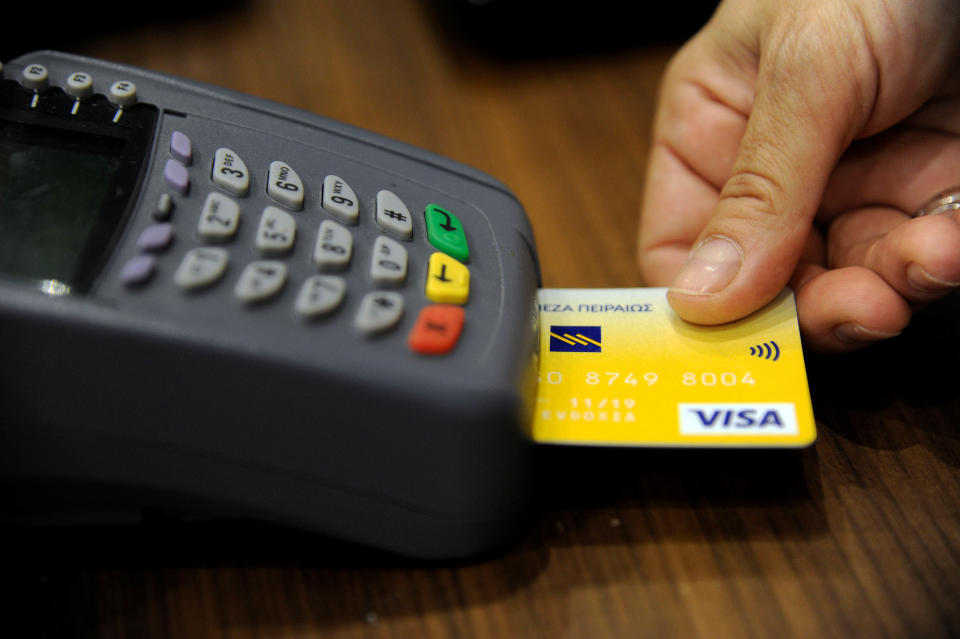Banks and retailers reignite the debit card fee war. It's hard to know who to root for

When you swipe a debit card at a store, the bank or card issuer charges the retailer a fee, which is capped by the Federal Reserve. But it wasn’t always. Before the Dodd-Frank Act was passed in 2010, companies like Visa (V) and Mastercard (MA) could set those fees, which critics alleged were anticompetitive and could be price-fixed. Sen. Dick Durbin (D-IL), a chief critic, added the regulation, now known as the Durbin Amendment.
For the banks, the Durbin Amendment meant fees collected from retailers have fallen from around 44 cents to 24 cents per transaction, according to the Federal Reserve. (Under the new system, fees were capped at 21 cents plus 0.05% of the amount.) That decline costs the bank billions of dollars each year. Retailers on, on the other hand, benefited from lower costs.
With Dodd-Frank firmly in the crosshairs of the Republican-controlled government, the Durbin Amendment is thrust back into the picture as House Financial Services Committee Rep. Jeb Hensarling (R-Texas) prepares a Dodd-Frank replacement bill, the Financial Choice Act. In a version of the regulation-crippling legislation proposed last year, the Financial Choice Act repealed the Durbin Amendment, and a Financial Services Committee memo detailing updates for the 116th Congress did not highlight any change.
All this points to a rehashing of the lobbying and legislative battle between two corporate groups. In this situation, however, it’s hard to tell which side will benefit consumers more.
Banks have been passing the fees back to the consumer
The Durbin Amendment was implemented to help keep prices down for consumers and prevent banks and card issuers from charging merchants exorbitant fees when consumers shop with debit cards.
When the amendment passed, Frank Keating, the head of the American Bankers Association, expressed dismay that the fee restrictions meant banks wouldn’t have enough revenue to provide low-cost checking and savings accounts to customers and fight fraud.
At the same time, a George Mason University study showed that retailers haven’t passed savings on to consumers by lowering prices. Instead, retailers have simply increased their margin. However, in a November Medium post, Sen. Durbin, the author of this legislation, pointed to the extremely thin net profit margins for retail in general, around 2% compared to big banks’ margins of 24% and Visa and MasterCard’s margins of 40%. Profits in retail, he says, have not soared.
For consumers, however, bank fees have ramped up. The George Mason study found that banks offering free checking fell 50% between 2009 and 2013. Balance requirements to qualify for free checking shot up by $500, and the unbanked population, which often relies on prepaid cards, increased by about a million people.
As Dodd-Frank was signed, JP Morgan Chase CEO Jamie Dimon mused, “If you’re a restaurant and you can’t charge for the soda, you’re going to charge more for the burger.” As the New York Times noted, Chase began charging for paper statements, scrapped its debit card rewards program, and discontinued free checking to some of its customers.
Still, this causality is tough to pin down to this issue alone. ”Visa and MasterCard were jacking up merchant fees for years prior to reform,” Durbin wrote in the November Medium post. “[And] they continue to try to increase merchant fees and create new fees whenever they are not restrained by market competition or regulation.”
To Durbin, the rule is still a success
A spokesperson for the senator told Yahoo Finance: “The years since its enactment have only reaffirmed the need to increase competition, transparency, and choice in the electronic payments system.” For Durbin, the amendment has been a success that has prevented price-fixing and anti-competitive behavior.
Not only should the rule not be scrapped, Durbin has written, there should be even more limits on price-fixing and enabling of competition. “Only in bank lobbyists’ minds is a system of price-fixed fees an example of a free marketplace.”
Furthermore, Durbin and Vermont Rep. Peter Welch say that rehashing the law is misdirection from a greater issue they think Congress needs to look at: Dealing with the rapidly changing electronic payments space.
In another Medium post from last year, the two lawmakers outlined three major changes: tokenized transactions for security, mobile devices replacing plastic cards, and biometric authentication. “Visa, MasterCard and the big banks know that if they can shape the rules and technology standards for these transitions, they can rig the system to entrench their own market dominance and generate untold billions for themselves in new fees,” they write.
As an example, they point to the rollout of EMV, noting that the U.S. version of EMV deviates from Europe by requiring a signature instead of a PIN, which takes longer and is less secure. “[The] EMV transition in the US was designed to stifle chip-and-PIN technology because Visa, MasterCard and their big bank issuers make more money when PINs are not used.”
All this makes it very hard to know who to root for. It’s possible that the answer is unsatisfying: Durbin is right on principle, but that the consumers will ultimately benefit from letting banks and card issuers have their way, because they may not settle for lower margins—even if those margins are much higher than those of retailers. In either situation, the bill will likely always come to the consumer. The only question may be who sends it.
Ethan Wolff-Mann is a writer at Yahoo Finance focusing on consumer issues, tech, and personal finance. Follow him on Twitter @ewolffmann. If you have a tip, please send to tips [at] yahoo-inc.com.
Read more:
The CFPB has returned $12B to consumers. Republicans want to kill it
Chase’s Sapphire Reserve is very worth it, even with its slashed bonus
Veterans group uses Trump’s well-known habits to target him with an ad
President Trump’s predecessors learned about tariffs the hard way
51% of all job tasks could be automated by today’s technology
